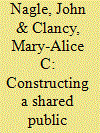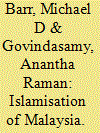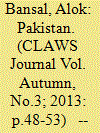| Srl | Item |
| 1 |
ID:
111491


|
|
|
|
|
| Publication |
2012.
|
| Summary/Abstract |
In order to bolster sustainable peace building in violently divided societies, a normative suggestion is that efforts should be made to construct a shared public identity that overarches ethnic divisions. A number of different centripetal/transformationist processes are identified as engineering a shared identity in comparison to consociational arrangements, which are accused of institutionalising ethnic differences and perpetuating conflict. These transformationist approaches essentially rest on the premise that because ethnicity is constructed it can be reconstructed into new, shared forms. Looking at Northern Ireland, we argue that there are limits to the extent that ethnicity can be reconstructed into shared identities. By analysing consociational and centripetalist/transformationist approaches to division, we conclude that although consociationalism will probably not deliver a common identity, it does provide a robust form of conflict regulation.
|
|
|
|
|
|
|
|
|
|
|
|
|
|
|
|
| 2 |
ID:
096286


|
|
|
|
|
| Publication |
2010.
|
| Summary/Abstract |
The relationship between religious, ethnic and national identities in Malaysia has long been fraught with uncomfortable tensions-especially for the 50 percent of Malaysians who are outside the dominant Malay-Muslim communal grouping. Until the accession of Dr Mahathir to the prime ministership at the beginning of the 1980s, it was clear that ethnic identity trumped religious identity, even though being Muslim was already intrinsic to being accepted as Malay. Being a non-Malay Malaysian was to accept a subordinate, but not a drastically uncomfortable role in the nation. Since the 1980s, however, religious identity appears to have replaced ethnicity as the central element of nation identity as the society has been systematically-even aggressively-Islamised. Yet appearances can be deceiving, and there is a strong case to be made that Islamisation in Malaysia is basically a variation of the original Malay ethnonationalism, using the nearly complete symbiosis between Malay and Muslim identity as the point of articulation that allows religious nationalism to serve as a cipher for ethnonationalism-but a version of ethnonationalism that is much less accommodating of minorities than was traditional Malay nationalism. This article places contemporary events in a historical context and then focuses on just one aspect of Malaysia's program of Islamisation that is both contemporary and central to national identity-developments in the education system, and particularly within the secondary school history curriculum-to demonstrate that in this instance at least, religious nationalism is operating as a surrogate for ethnic nationalism and has, in fact, intensified ethnic nationalism by raising the stakes for the communities that are outside the core national group.
|
|
|
|
|
|
|
|
|
|
|
|
|
|
|
|
| 3 |
ID:
125975


|
|
|